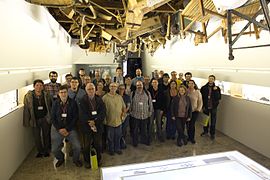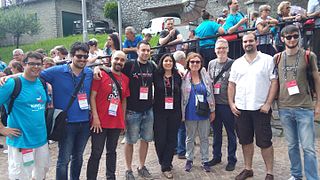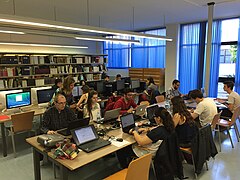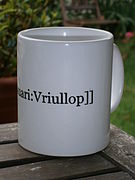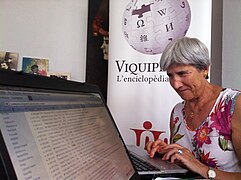Grants:APG/Proposals/2015-2016 round1/Amical Wikimedia/Impact report form
Purpose of the report
editThis form is for organizations receiving Annual Plan Grants to report on their results to date. For progress reports, the time period for this report will the first 6 months of each grant (e.g. 1 January - 30 June of the current year). For impact reports, the time period for this report will be the full 12 months of this grant, including the period already reported on in the progress report (e.g. 1 January - 31 December of the current year). This form includes four sections, addressing global metrics, program stories, financial information, and compliance. Please contact APG/FDC staff if you have questions about this form, or concerns submitting it by the deadline. After submitting the form, organizations will also meet with APG staff to discuss their progress.
Global metrics overview - all programs
editWe are trying to understand the overall outcomes of the work being funded across our grantees' programs. Please use the table below to let us know how your programs contributed to the Global Metrics. We understand not all Global Metrics will be relevant for all programs, so feel free to put "0" where necessary. For each program include the following table and
- Next to each required metric, list the outcome achieved for all of your programs included in your proposal.
- Where necessary, explain the context behind your outcome.
- In addition to the Global Metrics as measures of success for your programs, there is another table format in which you may report on any OTHER relevant measures of your programs success
For more information and a sample, see Global Metrics.
Overall
edit- Program 1
- Community
| Metric | Achieved outcome | Explanation |
| 1. # of active editors involved | 832 | program details |
| 2. # of new editors | 176 | program details |
| 3. # of individuals involved | 2,250 | program details |
| 4. # of new images/media added to Wikimedia articles/pages | 662 | program details |
| 5. # of articles added or improved on Wikimedia projects | 48,581 | program details |
| 6. Absolute value of bytes added to or deleted from Wikimedia projects | 3,308,610 | program details |
- Program 2
- Education and Knowledge
| Metric | Achieved outcome | Explanation |
| 1. # of active editors involved | 289 | program details |
| 2. # of new editors | 2,143 | program details |
| 3. # of individuals involved | 3,813 | program details |
| 4. # of new images/media added to Wikimedia articles/pages | 1,073 | program details |
| 5. # of articles added or improved on Wikimedia projects | 2,097 | program details |
| 6. Absolute value of bytes added to or deleted from Wikimedia projects | n/a | program details |
- Program 3
- Core projects
| Metric | Achieved outcome | Explanation |
| 1. # of active editors involved | 496 | program details |
| 2. # of new editors | 442 | program details |
| 3. # of individuals involved | 1,648 | program details |
| 4. # of new images/media added to Wikimedia articles/pages | 2,740 | program details |
| 5. # of articles added or improved on Wikimedia projects | 3,342 | program details |
| 6. Absolute value of bytes added to or deleted from Wikimedia projects | n/a | program details |
Telling your program stories - all programs
editPlease tell the story of each of your programs included in your proposal. This is your chance to tell your story by using any additional metrics (beyond global metrics) that are relevant to your context, beyond the global metrics above. You should be reporting against the targets you set at the beginning of the year throughout the year. We have provided a template here below for you to report against your targets, but you are welcome to include this information in another way. Also, if you decided not to do a program that was included in your proposal or added a program not in the proposal, please explain this change. More resources for storytelling are at the end of this form. Here are some ways to tell your story.
- We encourage you to share your successes and failures and what you are learning. Please also share why are these successes, failures, or learnings are important in your context. Reference learning patterns or other documentation.
- Make clear connections between your offline activities and online results, as applicable. For example, explain how your education program activities is leading to quality content on Wikipedia.
- We encourage you to tell your story in different ways by using videos, sound files, images (photos and infographics, e.g.), compelling quotes, and by linking directly to work you produce. You may highlight outcomes, learning, or metrics this way.
- We encourage you to continue using dashboards, progress bars, and scorecards that you have used to illustrate your progress in the past, and to report consistently over time.
- You are welcome to use the table below to report on any metrics or measures relevant to your program. These may or may not include the global metrics you put in the overview section above. You can also share your progress in another way if you do not find a table like this useful.
Program 1: Community
edit- Community care program in pictures
-
Viquitrobada 2016 venue in cost free (in kind donation)
-
Catalan speakers at Wikimania 2016
-
15th anniversary of Cawiki lunch
-
Did a challenge to reach 500k articles in Catalan Wikipedia
| Target | Last year (if applicable) | Progress (at end of Q2) | Finished (end of year) | Comments | ||||
|---|---|---|---|---|---|---|---|---|
| Organising Viquitrobada 2016, Catalan Wikimedians AGM | 2015 edition |
|
|
Viquitrobada 2016 edition. It was not Amical's AGM but community's AGM. | ||||
| 4 formative seminars for Wikimedians | Seminars done during Viquitrobada 2015 |
|
|
We organized internal workshops for wikimedians | ||||
| Following each volunteer driven activity | 2015 APG impact report |
|
|
We've been following all volunteer proposals so far this year (e.g. Barcelona ComiCon, Temps de Flors...) | ||||
| Community grants | Wikimania 2016 & Temps de Flors Girona |
|
|
We've funded 5 grants for Wikimania 2016, Temps de Flors Girona and all community led writing challenges. |
| Successes | Challenges | Learnings (so far) |
|---|---|---|
|
|
|
Program 2: Education & Knowledge
edit- Education program in pictures
-
University of Vic includes Wikipedia as a core project in their innovation lab
-
Future librarians editing Wikipedia at University of Barcelona
-
Hungarian students updating catalan culture Wikipedia articles in their language
-
Editathon in a Science research centre
| Target | Last year (if applicable) | Progress (at end of Q2) | Finished (end of year) | Comments | ||||
|---|---|---|---|---|---|---|---|---|
| Number of Classrooms collaborating with Wikipedia | 2015 impact report |
|
|
59 Projects done course 2015-2016 and 41 ongoing so far for 2016-2017. | ||||
| New Mindset on knowledge sector | N/A |
|
|
We have published papers on reference magazines. Contacted key members in both cultural and educational sector. It is a mid term investment but we are already seeing some results |
| Successes | Challenges | Learnings (so far) |
|---|---|---|
|
|
|
| 07-08 | 08-09 | 09-10 | 10-11 | 11-12 | 12-13 | 13-14 | 14-15 | 15-16 | 16-17 |
|---|---|---|---|---|---|---|---|---|---|
| 3 | 1 | 3 | 4 | 7 | 13 | 38 | 46 | 59 | 41 |
Program 3: Core Projects
edit- Community suggested, other partnerships and innovation projects in pictures
-
Catalan version of #1lib1ref project was a success
-
200 libraries are participating in our #Bibliowikis project
-
Personalized mugs for winners in Online contests.
-
#Viquidones initiatives are finally starting to reduce the gender gap
-
We promote diversity with projects like Asian Month or Making Africa
-
Viquidones has become one of the core tracks of the year.
| Successes | Challenges | Learnings (so far) |
|---|---|---|
|
|
|
How do our partners see us?
editAs part of a process of internal evaluation at the end of 2016 we conducted a survey by mail to people and organizations with whom we have carried out a project in recent years. The responses from various sectors such as museums, universities, libraries and government agencies, confirm some of the core ideas of Amical model and they suggest what should be the priorities for the future.
Altogether thirty people answered the survey, including technical people and managers. This is a representative sample of the type of partnerships we are trying to build. This article summarizes some of the most significant answers.
- Helping both ways
When asked how can Wikipedia help your institution, most answers point out that Wikipedia contributes to its openness and helps them in their mission to make knowledge generated by its experts available to public: “gives visibility”, “open minded ways of seeing the world”, “dissemination work”, “facilitates social return”. Some also add their views as users: “increasingly useful source”, “essential for the students.” Several people have emphasized the value for the Catalan language.
Our partners are aware of what they can do to help Wikipedia: “spread its content”, “contribute with reliable content”, “help improve its image among the public”, “make small contributions”.
- Mental picture improvement
In our strategic plan we have a branch devoted to readers. The number of visitors remains very low, especially for social and technical reasons. For example, most of the browsers of Catalan readers are configured by default in Spanish language.
We want to increase visitors but mostly we want to improve the perception of the project. Quality can help increasing readers (later editors). Seeing how it works, people can better use our content and they can help us to expand it. Therefore, we asked whether the perception of Wikipedia had changed after doing a project with us and we also asked them advice in this regard.
About the mental picture, some claim that they had a prior good concept but the majority found that the perception has improved a lot since we started a joint collaboration. Aspects that stand out are the quality of articles (“rigor of content and flexibility to incorporate improvements”, “I thought it was just an amateur project”, “now for me it is more credible”, “it was a sort of intruder in my job and now it is an ally”), the knowledge of the community (“it is no longer something distant”, “people are eager to work”, “formerly it was a hidden motive to understand how it could have grown so much only with volunteers”) and internal operations (“I am more aware of its evolution”, “my respect has gone from big to huge”, “some clichés disappear knowing their philosophy and operating”).
They think that main obstacles for readers are obsolete or not visual design and lead section of articles which should be affordable for everyone and summarize the essential information. They believe that there is still much work to do to make the site gains in prestige and to achieve it they point to the need to include more references (accessible by readers) and further improve linguistic review.
They value the Visual Editor and edit-a-thons as essential elements to remove technical barriers and to increase users who need an introduction to understand and subsequent guidance. Close monitoring helps them “feel part of a whole” and “have more motivation to participate”. As unresolved issues in terms of editing they point to the interaction with others and, above all, uploading images still seen as too complex processes.
- Aspects to keep, aspects to change
Last block is referred to the procedural evaluation: how do you assess the cooperation with us, which aspects we should keep or change.
We must say that we are delighted by the enthusiasm and positive responses because everyone, without exception, say they would recommend us to other institutions (and many actually do). In fact, rather than changes in the model, demands are increasing participation (“more edit-a-thons”, “more network dialogue”, “further joint collaborations”).
Among qualities they include “passion”, “availability and speed of response”, “a groundbreaking approach in today’s world” and “effort”. Undoubtedly, we will work to keep us live up to those expectations!
In short, we can learn from the survey which aspects are most valued by readers and related institutions to continue to improve our daily work with organizations because, as one respondent stated, “the dissemination of knowledge is essential to improve society”.
Revenues received during this period
editPlease use the exchange rate in your APG proposal.
Table 2 Please report all spending in the currency of your grant unless US$ is requested.
- Please also include any in-kind contributions or resources that you have received in this revenues table. This might include donated office space, services, prizes, food, etc. If you are to provide a monetary equivalent (e.g. $500 for food from Organization X for service Y), please include it in this table. Otherwise, please highlight the contribution, as well as the name of the partner, in the notes section.
Revenue source Currency Anticipated Q1 Q2 Q3 Q4 Cumulative Anticipated ($US)* Cumulative ($US)* Explanation of variances from plan Membership fees + donation EUR 2.500,00 1.010,60 3.462,90 4.473,50 2.648,48 4.739,18 Partnerships EUR 3.000,00 2.330,00 0,00 2.330,00 3.178,17 2.468,38 Conferences and workshops EUR 2.000,00 766,00 3.530,00 4.296,00 2.118,78 4.551,14 APG EUR 68.000,00 39.667,00 28.333,00 68.000,00 72.038,52 72.038,52 Other EUR TOTAL EUR 75.500,00 43.773.60 35.325,90 79.099,50 79.983,95 83.797,22
* Provide estimates in US Dollars
Change EUR/USD 1,05939 ECB, on March 1, 2017
Spending during this period
editPlease use the exchange rate in your APG proposal.
Table 3 Please report all spending in the currency of your grant unless US$ is requested.
- (The "budgeted" amount is the total planned for the year as submitted in your proposal form or your revised plan, and the "cumulative" column refers to the total spent to date this year. The "percentage spent to date" is the ratio of the cumulative amount spent over the budgeted amount.)
Expense Currency Budgeted Q1 Q2 Q3 Q4 Cumulative Budgeted ($US)* Cumulative ($US)* Percentage spent to date Explanation of variances from plan Program 1: Community EUR 7.500,00 5.102,64 4.506,27 9.608,91 7.945,43 10.179,58 128,12% Program 2: Education & Knowledge EUR 35.500,00 13.589,86 19.402,94 32.992,80 37.608,35 34.952,24 92,94% Program 3: Core projects EUR 32.500,00 12.451,48 15.303,54 27.755,02 34.430,18 29.403,39 85,40% TOTALS EUR 75.500,00 31.143,98 39.212,75 70.356,73 79.983,95 74.535,22 93,19%
* Provide estimates in US Dollars
Change EUR/USD 1,05939 ECB, on March 1, 2017
Compliance
editIs your organization compliant with the terms outlined in the grant agreement?
editAs required in the grant agreement, please report any deviations from your grant proposal here. Note that, among other things, any changes must be consistent with our WMF mission, must be for charitable purposes as defined in the grant agreement, and must otherwise comply with the grant agreement.
- Yes
Are you in compliance with all applicable laws and regulations as outlined in the grant agreement? Please answer "Yes" or "No".
- Yes
Are you in compliance with provisions of the United States Internal Revenue Code (“Code”), and with relevant tax laws and regulations restricting the use of the Grant funds as outlined in the grant agreement? Please answer "Yes" or "No".
- Yes
Signature
edit- Once complete, please sign below with the usual four tildes.
Resources
editResources to plan for measurement
edit- Global metrics are an important starting point for grantees when it comes to measuring programmatic impact (Learning Patterns and Tutorial) but don’t stop there.
- Logic Models provide a framework for mapping your pathway to impact through the cause and effect chain from inputs to outputs to outcomes. Develop a logic model to map out your theory of change and determine the metrics and measures for your programs.
- Importantly, both qualitative and quantitative measures are important so consider both as you determine measures for your evaluation and be sure to ask the right questions to be sure to capture your program stories.
Resources for storytelling
edit- WMF storytelling series and toolkit (DRAFT)
- Online workshop on Storytelling. By Frameworks institute
- The origin of storytelling
- Story frames, with a focus on news-worthiness.
- Reading guide: Storytelling and Social change. By Working Narratives
- The uses of the story.
- Case studies.
- Blog: 3 Tips on telling stories that move people to action. By Paul VanDeCarr (Working Narratives), on Philanthropy.com
- Building bridges using narrative techniques. By Sparknow.net
- Differences between a report and a story
- Question guides and exercises.
- Guide: Tools for Knowledge and Learning. By Overseas Development Institute (UK).
- Developing a strategy
- Collaboration mechanisms
- Knowledge sharing and learning
- Capturing and storing knowledge.
